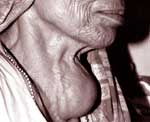Healthy pinch
 the Union government is considering the restoration of the national ban on the consumption of non-iodised salt. The move has been triggered by reports of surveys conducted in various states on iodine deficiency disorders (idd), according to sources in the Union ministry of health and family welfare (mohfw). A letter sent recently by the ministry's Department of Women and Child Development urged it to re-impose the ban. idds are an important cause of mental handicap among children and are widespread in India; 241 districts out of 282 surveyed reported high incidence.
the Union government is considering the restoration of the national ban on the consumption of non-iodised salt. The move has been triggered by reports of surveys conducted in various states on iodine deficiency disorders (idd), according to sources in the Union ministry of health and family welfare (mohfw). A letter sent recently by the ministry's Department of Women and Child Development urged it to re-impose the ban. idds are an important cause of mental handicap among children and are widespread in India; 241 districts out of 282 surveyed reported high incidence.
Health experts emphasise the importance of strict regulation in the matter. A recent study conducted by the All India Institute of Medical Sciences (aims) shows that following the imposition of the ban on non-iodised salt by the Delhi government, goitre prevalence in the state has decreased markedly: six per cent at present against 52 per cent in 1980. Still, only 63.1 per cent residents consume salt with the stipulated iodine level. Umesh Kapil, who led the study, says: "The goitre problem is cosmetic but the t 3 [tri-iodothyronine], which makes irreparable loss to brain development, is quite serious.'
Implementation of the ban on non-iodised salt becomes a tricky issue since salt, an "essential item', is a Central subject as per India's Constitution. But health issues are within the purview of state governments. In May 1998, following the Union government's notification, every state except Kerela banned the human consumption of non-iodised salt. But most of them did not adhere to it once the national ban was lifted in 2000. However, the mohfw claims that state-level ban exists in 32 states and union territories.
Kapil says there are two main aspects of the ban. "The scientific aspect calls for the ban. The administrative aspect calls for rehabilitating small farmers who produce the salt with some alternative form of livelihood.' In fact, the earlier national ban was opposed on the ground of this administrative problem. But Madhu G Karmarkar, senior advisor, International Council for Control of Iodine Deficiency Disorders, says: "Salt farmers won't be in trouble. They produce raw salt. The middlemen market this non-iodised salt. It is the manufacturers who should impose strict norms before the salt reaches the market.' Meanwhile, B K Tiwari, advisor (nutrition), mohfw, says he is not aware of reconsideration of the ban.
